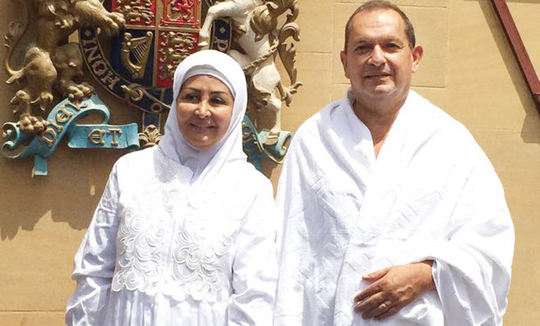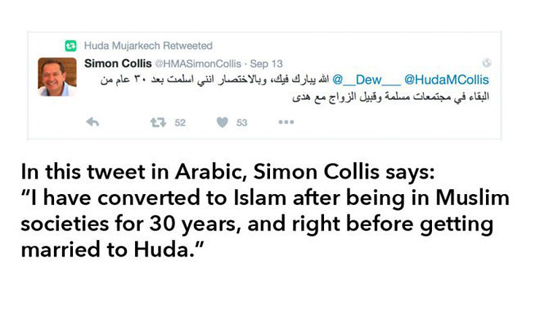Mina, Sep 15: Among the 19,000 British pilgrims performing Haj this year was British Ambassador to Saudi Arabia Simon Paul Collis and his wife Huda Mujarkech.

It was known to some diplomats and journalists that he had embraced Islam but there had been no official word.
The confirmation came on last week in the form of a tweet from Saudi writer and academic Fawziah Al-Bakr (@fawziah1).
She posted two photos of Ambassador Collis and his wife in which he was wearing ihram.
The ambassador replied to the post by thanking Al-Bakr via his official Twitter handle (@HMASimonCollis). The ambassador’s wife (@HudaMCollis) retweeted Al-Bakr’s post.

Though Collis refused media requests for interviews on Wednesday, he said: “I have converted to Islam after being in Muslim societies for 30 years, and right before getting married to Huda.”
Collis has served as British ambassador to Saudi Arabia since January last year when Sir John Jenkins retired from the diplomatic service. The photos went viral on Twitter, Facebook, WhatsApp and Instagram, sending social media into overdrive.
Among the first who congratulated the ambassador and his wife was Princess Basmah bint Saud (@PrincessBasmah).
“Special congratulations to the ambassador and his wife,” wrote Princess Basmah.
“Thank you, Princess Basmah,” replied the ambassador.
British pilgrims were pleasantly surprised by the news.
“I would like to congratulate the ambassador on the historic occasion of his completion of Haj,” said Rashid Mogradia, CEO of the Council of British Hajis (CBHUK). “He is one of many thousands of British pilgrims to perform the journey of faith and we look forward to him sharing his experience and inspiring us all,” Mogradia added.
At a time when there is so much adverse publicity against Islam and Muslims, especially in the West, the ambassador’s embrace of Islam was seen by the faithful as a vindication of the religion’s universal appeal.
Collis speaks fluent Arabic. He joined the British Foreign and Commonwealth Office (FCO) in 1978 and, after studying Arabic, has served mainly in the Arab world.
A father of five children, his first posting was to Bahrain as second secretary (1981-1984). He served as British ambassador to Iraq (2012-2014), Syria (2007-2012) and Qatar (2005-2007). He was the British consul-general in Dubai (2000-2004) and in Basra (2004-2005). He also served in New Delhi as first secretary from 1991 to 1994.





Comments
Allah made Heven for Muslims who believe him and Hell for non believers.
Allah hu Akbar
NON MUSLIMs should PONDER on WHY many people are REVERTInG to ISLAM...
QURAN has the answer to YOUR QUESTION... despite there is lot of hate propaganda in the controlled MEDIA....
QURAN speaks the reality of Such MEDIA and those who control the MEDIA ... PLease read the QURAN ..
U can also check thequranproject online... which is well explained for the Non muslims... & FOR non arab muslims.
Please look for the TRUTH and come out of DARKNESS... ALLAH guides those who search for God... honestly.
Allahu Akbar. Congragulations for accepting islam. May allah guide u both to right path. Ameen.
May Allah accept ur haj.
Ameen yarabbal alameen....
Add new comment